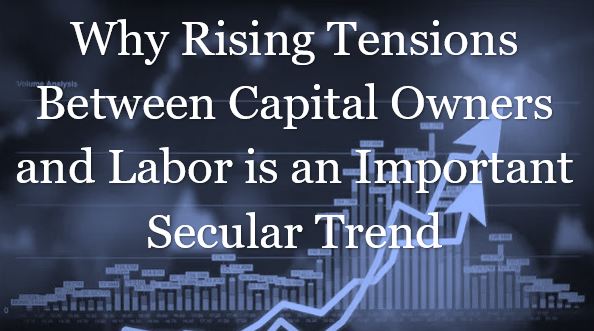Published on: 12/11/2020 • 6 min read
Avidian Report – Why Rising Tensions Between Capital Owners and Labor is an Important Secular Trend
INSIDE THIS EDITION:
Why Rising Tensions Between Capital Owners and Labor is an Important Secular Trend
Year-End Tax and Financial Planning Ideas Coronavirus / Election Edition
Coronavirus / COVID-19 Resource Center

As we have over the last couple of weeks, we are continuing our series discussing the five major trends that we believe investors should be watching as we move into 2021. This is the third of 5 installments of the series that we believe may help investors think about how they should be positioned from a strategic asset allocation standpoint as we move into next year and beyond.
[toggle title=’Read More’]
We have said it in each of the two previous newsletters and will reiterate it here: for investors’ financial outcomes, we believe being exposed to the correct long-term secular trends could ultimately determine long-term success for portfolios. There are numerous examples we can point to from the last business cycle where the secular trends became drivers for portfolio outperformance.
The chart below does a pretty good job laying this history out for us going all the way back to the 1960s when Bretton Woods sparked a series of events that also influenced the asset classes that performed. The same happened in 1980 to 2010s when a drive to increase globalization, financialization, and digitalization drove the sectors and asset classes that profited.

And we posit that secular trends will continue to be key components of portfolio performance in the current regime that we believe will be led in large part by accelerating innovation.
That backdrop then sets the stage for discussing the third trend in our series. Namely, rising tensions between the owners of capital and labor. This secular trend is partially a result of rapid innovation across industries, which we discussed last week. However, it is certainly a bit less powerful than the trends we are seeing in population growth and in technological innovation. Despite that, however, it is likely to be quite important as we move into the next 10 years.
Big implications related to this third secular trend that we are discussing here have to do with two knock-on effects. First, the potential wealth transfer that may occur because of the tension between capital and labor, and second, the potential this trend has for governments as they may be forced to step in to provide some type of social safety-net as the chasm between the wealthy and the poor stands to widen.
When we talked about technological innovation last week, we discussed how platform companies driving innovation tend to employ asset-light business models. The chart on the left below shows the top 5 market cap US corporations and the size of their workforces back in 1962. It also shows the same data for the top 5 market cap US corporations and the size of their workforces in 2019. Here you will note two things. First, the type of companies has gone from large industrial companies in 1962 to now largely technology companies and secondly, and perhaps more telling, is the huge decline in the workforces of the largest companies. But what is even more striking is the worker numbers between traditional companies and technology companies. The chart on the right below shows this disparity within the gaming industry.

We fully expect this trend to accelerate as we move into 2021 and beyond, with fewer workers being needed in large part due to technology. This is shown very clearly in the chart below which shows that three-fourths of the decrease in labor share in the US since 1947 have occurred since the year 2000. What this holds for the world is growing economic equality in the US and abroad.
What we have already seen is that as the disparity has grown, and tensions between capital providers and labor-renters rose, so too have the instances of social unrest. As investors, all we must do is think about what we saw related to BREXIT, occupy wall street, and the like. It is our belief that this trend is likely to continue as the tension between capital and labor intensifies thanks in large part to rising technological adoption and a growing portion of the workforce lacking skills necessary to fill jobs in the innovation economy.

As you might imagine all of this has portfolio implications that we as investors must be cognizant of.
First, this secular trend could negatively impact long-term investment performance and volatility. Especially if corporations do not adequately plan for it, and governments fail to respond with social safety nets to stymie system issues. Second, the trend could drastically change the risk profile of certain investments, even in developed economies. Investors therefore must be prepared to address these challenges in their portfolios. Third, it could lead to financial system instability if policy and governance prove ineffective at fighting growing tailwinds to inequity. And lastly, it will impact the opportunity set that investors may wish to invest in. For example, it may usher in an era where environmental, social, and governance (ESG) metrics are true drivers of portfolio performance and risk mitigation.
Weekly Global Asset Class Performance

[/toggle]
Year-End Tax and Financial Planning Ideas Coronavirus / Election Edition
Written by Scott A. Bishop, MBA, CPA/PFS, CFP® and Michael Churchill, CPA/MSPA, CFP®
There is no question that 2020 has been a year that everyone just wants to put behind them and hope for a brighter 2021. But before you start thinking about 2021, do not forget about your 2020 year-end tax and financial planning because there are still opportunities and strategies to consider, at least from a planning perspective, to take advantage of before year-end.
Click Here To Read The Full Article

Over the last several weeks, the team at Avidian Wealth has attempted to keep our clients apprised of updates related to the markets, economy, government, tax, retirement, and other changes impacting us during this difficult time. As the Coronavirus (COVID-19) pandemic continues to spread, its impact on businesses and individuals has been significant. Stay up-to-date on the latest news with this Coronavirus Resource Center as your go-to resource for commentary, news, and other resources. Bookmark this article to check back regularly for updates.
Click Here to Explore the COVID-19 Resource Center
Please read important disclosures here
Get Avidian's free market report in your inbox

Schedule a conversation
Curious about where you stand today? Schedule a meeting with our team and put your portfolio to the test.*